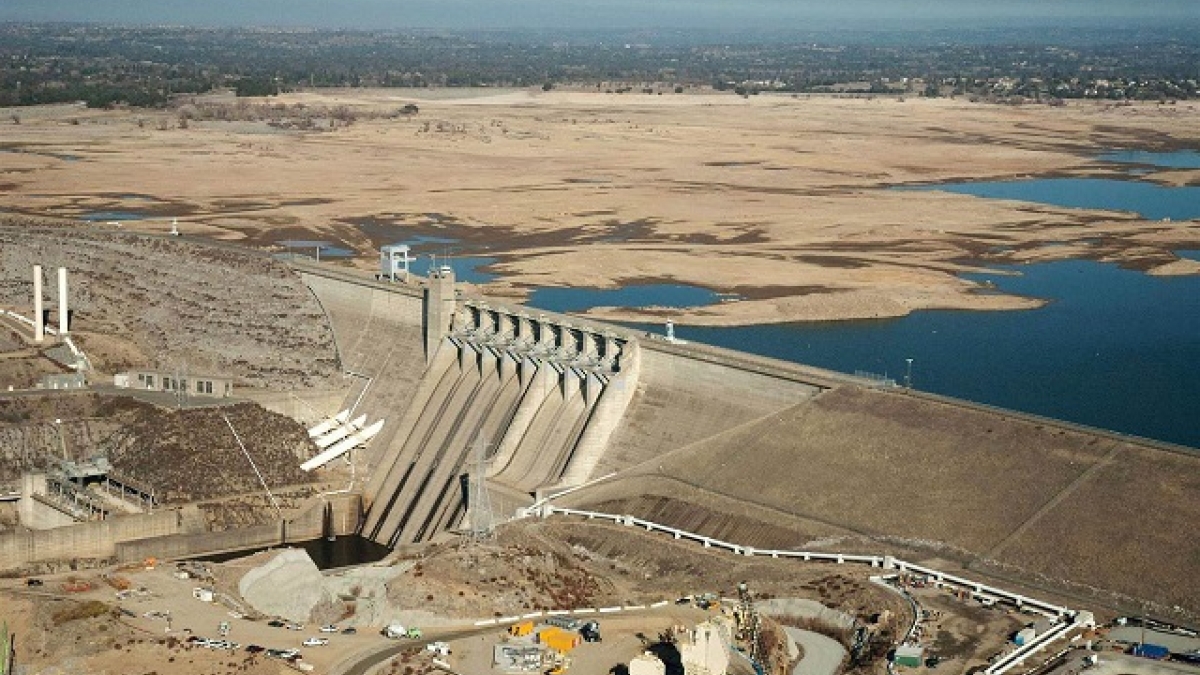ASU part of $12M award to establish water sustainability network

Recent droughts have had crippling effects on Folsom Lake and other water supply systems in California (January 16, 2014). Photo by Paul Hames/California Department of Water Resources
A consortium of 14 academic institutions and key partners across the United States is addressing the challenges that threaten urban water systems in the U.S. and around the world. With support from a $12 million cooperative agreement from the National Science Foundation, Arizona State University is part of the Sustainable Research Network called the Urban Water Innovation Network (UWIN).
The mission of UWIN, which is led by Colorado State University, is to create technological, institutional and management solutions to help communities increase the resilience of their water systems and enhance preparedness for responding to water crises.
Researchers at ASU will address a spectrum of issues related to hydroclimate, engineering and socioeconomic aspects that are required to comprehensively examine urban sustainability solutions.
“Elements of our part of the project include advancing state-of-the-art urban meteorology and climate models to enhance our physical understanding of the urban environment, with a particular emphasis on urban modifications of the water cycle and how they interconnect with impacts on human health, energy demand and socioeconomic groups and vulnerable populations,” said Matei Georgescu, assistant professor in the School of Geographical Sciences and Urban Planning and the principle investigator for the ASU part of the project. “The work builds on ASU’s interdisciplinary research, combining unique strengths from a wide array of disciplines, focused on development of actionable solutions that promote smart and sustainable urbanization,”
Georgescu is joined by co-principal investigators Zhihua Wang, School of Sustainable Engineering and the Built Environment, and Elizabeth Mack of the School of Geographical Sciences and Urban Planning. Other ASU researchers involved are: Nancy Grimm, School of Life Sciences; David Hondula, Center for Policy Informatics and the School of Geographical Sciences and Urban Planning; Sharon Harlan, School of Human Evolution and Social Change; Mohamed Moustaoui and Alex Mahalov of the School of Mathematics and Statistical Sciences; and Jennifer Vanos, at Texas Tech. Several ASU faculty have affiliations with the Julie A. Wrigley Global Institute of Sustainability.
According to the 2014 Global Risks Perception Survey by the World Economic Forum, water crises are the top global risk to the viability of communities throughout the world. From crippling droughts and water shortages in the West to devastating floods in the East and South, water systems in the U.S. have been impacted by changes in climate, demographics and other pressures. Our absolute reliance on water is why Americans express greater concern about threats to water than about any other environmental issue and why more than half of all Americans worry a great deal about it, according to latest Gallup poll of environmental concerns.
Extreme events and global climate change can have profound impacts on water security, shattering the most vulnerable communities and instilling enormous costs on governments and economies. Effective response to these challenges requires transitioning to both technological and management solutions that protect water systems from pressures and enhance their resilience.
UWIN will create an enduring research network for integrated water systems and cultivate champions of innovation for water-sensitive urban design and resilient cities. The integrated research, outreach, education and participatory approach of UWIN will produce a toolbox of sustainable solutions by simultaneously minimizing pressures, enhancing resilience to extreme events and maximizing co-benefits. These benefits will reverberate across other systems, such as urban ecosystems, economies and arrangements for environmental justice and social equity.
The network will establish six highly connected regional urban water sustainability hubs in densely populated regions across the nation to serve as innovation centers, helping communities transition to sustainable management of water resources. Strategic partnerships and engagement with other prominent U.S. and international networks will extend UWIN’s reach to more than 100 cities around the world. Key UWIN partners and collaborators include the Water Environment Research Foundation, the Urban Sustainability Directors Network and the Network for Water in European Regions and Cities.
This innovative and adaptive research approach will ultimately produce an Urban Water Sustainability Blueprint, outlining effects and tradeoffs associated with sustainable solutions for cities of all sizes. It will also provide steps and guidance for action based on the collective knowledge gained by the research and the collaborative approach of the Sustainable Research Network. The blueprint will be rigorously vetted by regional stakeholders across the U.S. and the global urban water community.
In addition to ASU and Colorado State, the UWIN consortium includes:
• Cary Institute of Ecosystem Studies
• Florida International University
• Howard University
• Oregon State University
• Princeton University
• University of Arizona
• University of California-Berkeley
• University of California-Riverside
• University of Maryland Baltimore County
• University of Miami
• University of Oregon
• University of Pennsylvania